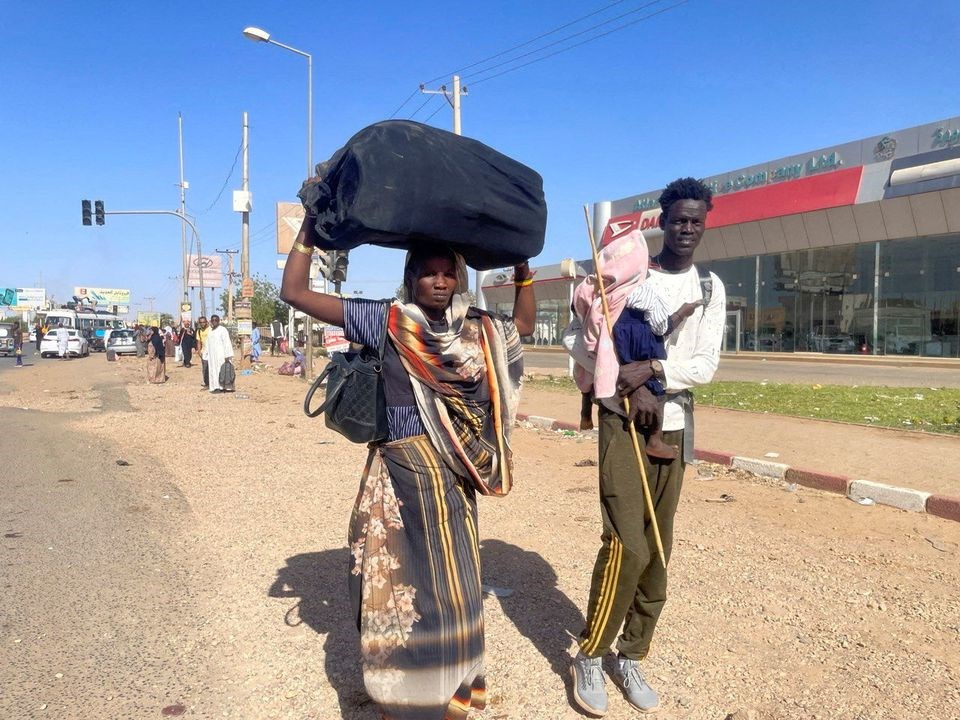The blame game is on between Sudan's warring parties
Sudan's battling generals continue to engage in a tit-for-tat blame game, intensifying a verbal war that suggested there was little room for compromise in their fight in Africa's third-largest country.
-

People gather at the station to flee from Khartoum during clashes between the paramilitary Rapid Support Forces and the army in Khartoum, Sudan, April 19, 2023 (Reuters)
Sudan's warring sides accused each other, on Thursday, of being behind violations of the latest ceasefire that was mediated by the US and Saudi Arabia, now in its third day.
The one-week truce was breached only minutes after it was put into effect on Monday night, with residents of the capital Khartoum reporting airstrikes and artillery fire rocking the city.
There have now been other violations of the ceasefire deal, which is intended to allow much-needed humanitarian supplies to reach war-torn areas of the North African country.
It is the latest in a series of fragile ceasefires that have all been systematically violated.
Sudan has sunk into chaos since the clashes erupted on April 15 between forces of rival generals -- General Abdel Fattah Al-Burhan's Sudanese Armed Forces and Mohammed Hamdan Dagalo's Rapid Support Forces (RSF).
But though the current ceasefire has been violated, it has permitted for a lull in clashes that have seen trapped residents cautiously venture out of their homes, some for the first time in weeks.
After nearly six weeks of conflict that has exhausted crucial supplies and driven the healthcare system to the verge of collapse, many have gone out in search of food and water or to seek much-needed medical assistance.
In a statement published late Wednesday, the RSF, commanded by Mohammed Hamdan Daglo, tried to accuse the army led by Sudan's de facto leader, Abdel Fattah Al-Burhan, of ceasefire violations.
The army "launched a series of unwarranted attacks today," the RSF said, adding that "our forces decisively repelled these assaults."
"Our forces successfully shot down a SAF MiG jet fighter," it said, reiterating however that it remained "committed to the humanitarian truce" and called on the "aggressors to respect the ceasefire."
The army responded Thursday morning, saying it had "countered an attack on armored vehicles by the militias of the Rapid Support Forces in a clear violation of the truce."
The US and Saudi observers said, on Wednesday, that "fighting in Khartoum appeared to be less intense."
Washington and Riyadh, which mediated the ceasefire between the forces of two rival generals, however, pointed to reports "indicating that both sides violated the agreement."
Meanwhile, the chaos has left millions hunkering down in their homes to find shelters from the bullets and roaming looters amid power blackouts and shortages of water, food, medicines, and other staples.
Fighting between Sudan's rival generals has displaced over one million people within the country since it began on April 15, as per the International Organization for Migration.
Conditions have been particularly bleak in Darfur's western area, which has already been decimated by a conflict that started in 2003.
The conflict has so far killed more than 1,800 people, according to the latest figures from the Armed Conflict Location and Event Data Project.
Another 319,000 individuals have sought asylum in neighboring nations, according to the UN. Around 132,000 refugees have landed in Egypt, 80,000 in Chad, and 69,000 in South Sudan, the UN agency added.
Read next: Sudan: A borderless conflict

 3 Min Read
3 Min Read








